Friday, 24 October 2008
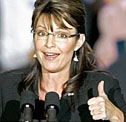 The actual US election is now less than a dozen days away. And if you’re wondering how an Associated Press-GfK poll can show Barack Obama at 44% nationally, and John McCain at 43%, while at least "two other surveys put Obama ahead by 10 points or more," you are not alone. Polling guru John Zogby has urged that this AP survey is "not only an outlier, it’s just preposterous!" (Zogby’s own current results put Obama ahead 52%–42%.) At the same time, even Zogby (who seems to be saying the AP survey underestimates an expected "sizeable turnout of young people") also finally allows that in this election "anything can happen." Or, as Rosa Brooks has explained in the Los Angeles Times, for many Americans still "America, after all, has been led by white Anglo-Saxons for the last two-plus centuries and, for the last 40 years, mostly by Republicans. For that to change is almost unthinkable." Even so, it is apparently equally true enough that most polls do show Barack Obama with a comfortable lead at the moment. The conventional wisdom is that, barring some altogether dramatic unforseen development, he is probably going to become the first US President of African American descent. And what many of us in Canada are already thinking about is what does this mean for the true north, strong and free, under Prime Minister Stephen Harper? The actual US election is now less than a dozen days away. And if you’re wondering how an Associated Press-GfK poll can show Barack Obama at 44% nationally, and John McCain at 43%, while at least "two other surveys put Obama ahead by 10 points or more," you are not alone. Polling guru John Zogby has urged that this AP survey is "not only an outlier, it’s just preposterous!" (Zogby’s own current results put Obama ahead 52%–42%.) At the same time, even Zogby (who seems to be saying the AP survey underestimates an expected "sizeable turnout of young people") also finally allows that in this election "anything can happen." Or, as Rosa Brooks has explained in the Los Angeles Times, for many Americans still "America, after all, has been led by white Anglo-Saxons for the last two-plus centuries and, for the last 40 years, mostly by Republicans. For that to change is almost unthinkable." Even so, it is apparently equally true enough that most polls do show Barack Obama with a comfortable lead at the moment. The conventional wisdom is that, barring some altogether dramatic unforseen development, he is probably going to become the first US President of African American descent. And what many of us in Canada are already thinking about is what does this mean for the true north, strong and free, under Prime Minister Stephen Harper?
A closer look at the polling numbers ...
 Another potential flaw in the Associated Press-GfK poll is that it sampled only "800 likely voters." This breaks a rule of thumb endorsed by some pundits — that any poll of anything with a sample of less than 1,000 is somewhat suspect to start with. Another potential flaw in the Associated Press-GfK poll is that it sampled only "800 likely voters." This breaks a rule of thumb endorsed by some pundits — that any poll of anything with a sample of less than 1,000 is somewhat suspect to start with.
Zogby’s own poll, e.g., involves "a three-day rolling average of 1,208 likely voters surveyed nationwide." This poll just keeps rolling on, or will until the actual election. And, according to Zogby, it shows "Obama gaining ground day by day. ‘These numbers, if they hold, are blowout numbers.’"
Casting a somewhat wider net, according to the USA Election Polls website, Obama was ahead by various percentage points in various polls as of October 23: "ABC: Obama +11, Zogby: Obama +10, FOX: Obama +9, Rasmussen: Obama +6, F&M: Obama +5, Gallup: Obama +5, Hotline: Obama +5, IBD: Obama +4, Battleground: Obama +2, AP: Obama +1."
On average, on this reading, Obama was ahead by 5.8%. On the same date, the "Realclearpolitics.com average of polls put Obama's lead at 7 points."
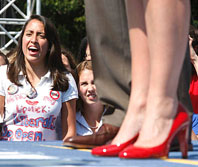 Despite Obama’s strong enough lead on average here, those of us in Canada who still remember the details of our own recent federal election on October 14 might be excused for thinking that the polls in our case were at least somewhat more consistent as the day of the actual election drew near. None of the polls surveyed in Andrew Heard’s tracking at the Simon Fraser University political science department, e.g., suggested that there was quite as little as a single percentage point separating the parties of Stephen Harper and Stephane Dion, a dozen days before the election. Despite Obama’s strong enough lead on average here, those of us in Canada who still remember the details of our own recent federal election on October 14 might be excused for thinking that the polls in our case were at least somewhat more consistent as the day of the actual election drew near. None of the polls surveyed in Andrew Heard’s tracking at the Simon Fraser University political science department, e.g., suggested that there was quite as little as a single percentage point separating the parties of Stephen Harper and Stephane Dion, a dozen days before the election.
Almost all the polls, it might be said, somewhat or even just slightly underestimated the exact percentage of the vote ultimately won by the Harper Conservatives. But virtually all the polls a dozen days before the election — and from there on in — suggested the most likely result would be another Conservative minority government (i.e. with the largest number but not a working majority of seats in Parliament). And that is exactly what happened.
As of October 23, the US polls do show a wider range of possibilities than the Canadian polls did. And statistically, it might be said again, there is a somewhat greater prospect that John McCain will be the next President of the United States than there was that Stephane Dion would be the next Prime Minister of Canada.
The most plausible reading of all this would seem to be that the American electorate is still in a rather more volatile and restless mood, on the eve of what will certainly be a very historic election. Whatever else, if the main thrust of the current polls proves correct, and Barack Obama is elected President on November 4, that will be an authentically epochal event in the history of the world, as well as just the United States. And it is not surprising that the American people should be in a somewhat turbulent state of mind, just before the deed is finally done...
But could Obama actually lose ... ?
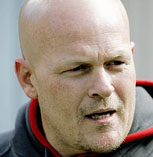 There are those who feel that, when all is said and done, and once you have extricated the American people’s understandable turbulent state of mind from your analysis, there is now virtually no way that Barack Obama can lose on November 4 — barring some unexpected reprise of the 9/11 terrorist attack, or something of that sort. There are those who feel that, when all is said and done, and once you have extricated the American people’s understandable turbulent state of mind from your analysis, there is now virtually no way that Barack Obama can lose on November 4 — barring some unexpected reprise of the 9/11 terrorist attack, or something of that sort.
Yet if it is true that "Polls Show Obama Gaining Among Bush Voters" and "Polls Point to Struggle for McCain" and "Sarah Palin dragging down Republican ticket: polls," the New York Times is also reporting that "In McCain’s Uphill Battle, Winning Is an Option." More exactly: "Mr. McCain’s advisers believe that if he wins or comes close in Pennsylvania, he will probably win in Ohio and Florida. Aides to Mr. McCain and Mr. Obama agree that Mr. McCain remains very much in the game in Ohio and Florida. Not easy, but not impossible either."
This train of thought goes on: "Pollsters say there has never been a year when polling has been so problematic, given the uncertainty of who is going to vote in what is shaping up as an electorate larger than ever. While most national polls give Mr. Obama a relatively comfortable lead, in many statewide polls, Mr. Obama and Mr. McCain are much more closely matched. Even a small shift in the national number could deliver some of the closer states into the McCain camp, making an Electoral College victory at least possible ..."
Then there are "some inopportune remarks" from Mr. Obama’s vice presidential running mate, Senator Joseph R. Biden Jr. of Delaware — in particular "Mr. Biden’s prediction that a foreign power would test Mr. Obama with a crisis in the first months of his presidency. That remark goes to what has been the heart of Mr. McCain’s argument about the need for the next president to have experience in handling high-stakes situations."
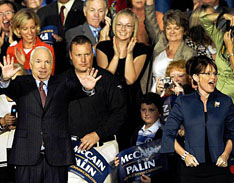 Just why Mr. Biden made this prediction seems unclear. The best explanation may be that he was just trying to prepare the American people for some tough times in the early days of an Obama-Biden administration. (And if you manage to catch the best media reports, it becomes clear that the key thing Senator Biden said was that, when Barack Obama is tested those doing the testing will find that he is "made of steel.") Yet Senator Biden’s inability to see that this was a foolish thing to say in the last days of the actual election campaign may raise a few questions about his judgment — and the judgment of Barack Obama in choosing Joe Biden as his Vice President. (Not remotely as bad as Sarah Palin, no doubt, but ... ) Just why Mr. Biden made this prediction seems unclear. The best explanation may be that he was just trying to prepare the American people for some tough times in the early days of an Obama-Biden administration. (And if you manage to catch the best media reports, it becomes clear that the key thing Senator Biden said was that, when Barack Obama is tested those doing the testing will find that he is "made of steel.") Yet Senator Biden’s inability to see that this was a foolish thing to say in the last days of the actual election campaign may raise a few questions about his judgment — and the judgment of Barack Obama in choosing Joe Biden as his Vice President. (Not remotely as bad as Sarah Palin, no doubt, but ... )
Finally, there is the inescapable "other question" about "whether there is a hidden resistance among whites to casting a ballot for an African-American. That could potentially be a problem for Mr. Obama in Ohio and Pennsylvania. Mr. Obama’s advisers argued that race had already been factored into polls; but ... [a recent] Times/CBS News poll found that one-third of voters said they knew someone who would not vote for Mr. Obama because he is black."
Similarly, there are still certainly at least some big and important states which Mr. Obama clearly has no chance of winning on November 4. Nobody will be surprised, e.g., that the Dallas Morning News is endorsing Senator McCain for President. And regardless of just how you may or may not view the Lone Star State of Texas yourself, there is no denying that it is now the second most populous state of the union — still well behind California, but ahead of New York.
(On the other hand, it may in the very end be a more potent sign of the times that even in Texas the Houston Chronicle is endorsing Senator Obama!)
The international reaction if he wins ...
 If and when Barack Obama does become President of the United States, there are clearly going to be some dramatic changes in domestic and international political symbolism. He might prove — as many even fair-minded conservatives have suggested — a really not very good chief executive officer of America, in many practical ways. (Or he might prove just the opposite!) But regardless of how things work out on this level, his election is bound to bring vast symbolic benefits. If and when Barack Obama does become President of the United States, there are clearly going to be some dramatic changes in domestic and international political symbolism. He might prove — as many even fair-minded conservatives have suggested — a really not very good chief executive officer of America, in many practical ways. (Or he might prove just the opposite!) But regardless of how things work out on this level, his election is bound to bring vast symbolic benefits.
Nicholas Kristof’s recent New York Times column, "Rebranding the US With Obama" is a case in point. It urges: "We’re beginning to get a sense of how Barack Obama’s political success could change global perceptions of the United States, redefining the American "brand" to be less about Guantánamo and more about equality. This change in perceptions would help rebuild American political capital in the way that the Marshall Plan did in the 1950s or that John Kennedy’s presidency did in the early 1960s."
Mr. Kristof’s column goes on: "In his endorsement of Mr. Obama, Colin Powell noted that ‘the new president is going to have to fix the reputation that we’ve left with the rest of the world.’ That’s not because we crave admiration, but because cooperation is essential to address 21st-century challenges; you can’t fire cruise missiles at the global financial crisis.
 "In his endorsement, Mr. Powell added that an Obama election ‘will also not only electrify our country, I think it’ll electrify the world.’ You can already see that. A 22-nation survey by the BBC found that voters abroad preferred Mr. Obama to Mr. McCain in every single country — by four to one over all. Nearly half of those in the BBC poll said that the election of Mr. Obama, an African-American, would ‘fundamentally change’ their perceptions of the United States. "In his endorsement, Mr. Powell added that an Obama election ‘will also not only electrify our country, I think it’ll electrify the world.’ You can already see that. A 22-nation survey by the BBC found that voters abroad preferred Mr. Obama to Mr. McCain in every single country — by four to one over all. Nearly half of those in the BBC poll said that the election of Mr. Obama, an African-American, would ‘fundamentally change’ their perceptions of the United States.
"Europe is particularly intoxicated by the possibility of restoring amity with America in an Obama presidency. As The Economist put it: ‘Across the Continent, Bush hatred has been replaced by Obama-mania.’
"Steven Kull, director of the Program on International Policy Attitudes, which conducted the BBC poll, said that at a recent international conference he attended in Malaysia, many Muslims voiced astonishment at Mr. Obama’s rise because it was so much at odds with their assumptions about the United States. Remember that the one thing countless millions of people around the world "know" about the United States is that it is controlled by a cabal of white bankers and Jews who use police with fire hoses to repress blacks. To them, Mr. Obama’s rise triggers severe cognitive dissonance ... ‘It’s an anomaly, so contrary to their expectation that it makes them receptive to a new paradigm for the US,’ Mr. Kull said."
And what about us ... up here in the Canadian attic ... ?
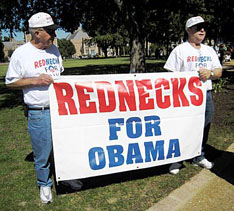 The near-ancient Richard Gwyn at the Toronto Star has just written a column that ponders just what President Barack Obama might mean for the only vaguely international (and typically almost invisible) US partner, north of George W. Bush’s "unfortified border" in Canada. The near-ancient Richard Gwyn at the Toronto Star has just written a column that ponders just what President Barack Obama might mean for the only vaguely international (and typically almost invisible) US partner, north of George W. Bush’s "unfortified border" in Canada.
Mr. Gwyn begins with: "Less than two weeks now remain for Canadians to prepare themselves to answer one of the most difficult of all political questions that can be posed to any citizen of this country ... This question is: ‘Could it be that we have got it wrong and the Americans have got it right?’ ... Being better than Americans in just about everything – well, not quite everything: they do make good movies and their football is better – is one of the key psychological props of the Canadian psyche."
Of course Mr. Gwyn is being satirical rather than serious here (?). In any case he goes on: "It's just about certain, though, that Barack Obama will win the presidential election on Nov. 4. Now the problem becomes clear ... Stephen Harper is very competent and smart and a good decision-maker. But he is to Obama as is an accountant to a poet – an exceptionally intelligent, cool, tough, resilient and unflappable poet, mind you." Nonetheless, to make a longer story much shorter: "By no means is all lost. Beyond question, we can go around saying, ‘Our banks are better’ ... Somehow, though, having an inspirational leader who is totally of the 21st century has an edge over being led by a solid, safe accountant."
Somehow all this seems to us quite wrong. (And quite apart from the fact that it takes Mr. Harper too much at his own evaluation of himself as "very competent and smart and a good decision-maker ... an accountant" — and too much discounts the still prevalent mean-and nasty, right-wing, neo-con ideologue side of his political personality.) We are ourselves hoping that if and when Barack Obama does become President of the United States, he will be helping to deliver some symbolic benefits to the USA’s best friend in all the world in Canada too.
Thus yet another recent North American newspaper column — by Rosa Brooks in the Los Angeles Times — has been urging that the "divisive GOP rhetoric we've been hearing lately is hardly new. But with each passing year, the ‘real’ America of GOP mythmaking bears less and less resemblance to the America most Americans live in."
Ms. Brooks goes on: "About 80% of Americans live in metropolitan areas, not small towns. A third of us are ethnic and racial minorities, but that's changing: Already, nearly 45% of children under 5 are minorities. Although 88%of us believe in God, 70% think that religions other than our own are equally valid routes to truth. And while 59% of us think that wearing an American flag pin is a decent way to show patriotism, even more of us (66%) think that protesting US policies we oppose is a good way to show patriotism. These days, more than half of us say we prefer the Democratic Party to the Republican Party."
 And then Ms. Brooks ends her column with: "Our culture was built by immigrants and shaped by wars, social upheavals, economic crises and further rounds of immigration, each time from places that seemed deeply ‘foreign’ to those who had already settled in. Each round of change was painful to those used to the temporary status quo — but each round of change also gave us a richer, stronger nation ... That's the real America: a land of change and perpetual renewal ... Let's stand up for it." And then Ms. Brooks ends her column with: "Our culture was built by immigrants and shaped by wars, social upheavals, economic crises and further rounds of immigration, each time from places that seemed deeply ‘foreign’ to those who had already settled in. Each round of change was painful to those used to the temporary status quo — but each round of change also gave us a richer, stronger nation ... That's the real America: a land of change and perpetual renewal ... Let's stand up for it."
President Obama, if he is elected on November 4, Rosa Brooks finally seems to be saying, will be bringing a fresh dose of realism to the USA — domestically and internationally. And here’s hoping that some of this fresh dose of realism will spill over into Canada too.
It is just plain foolish, as well as absurdly unrealistic, to pretend, as Richard Gwyn continues to at least pretend to do, that being "better than Americans in just about everything ... is one of the key psychological props of the Canadian psyche."
For a host of reasons, keeping Canada as an at least aspiring country in its own right, separate from the United States, makes eminent good sense. But that does not mean that Canadians have to pretend they are "better than Americans in just about everything."
This is, among other things, a very American approach to being Canadian. Or at least a John McCain-type American approach, which says Americans are better than anyone else in the world at just about everything. One of the encouraging things about Barack Obama’s new political symbolism is that it seems to promise a more realistic approach to defining who Americans are in the global village today — one which says, e.g., "that protesting US policies we oppose is a good way to show patriotism."
We need more of the same kind of 21st century democratic impulse in Canada too. We need much more of saying that protesting Canadian policies we oppose is a good way to show our patriotism. And hopefully, if and when Mr. Obama does become President of the United States, we will have to start defining our Canadian relationship with his version of the USA today in fresh and more realistic ways. And that will make us stronger and better Canadians too. Only registered users can write comments.
Please login or register. Powered by AkoComment 1.0 beta 2!
|
